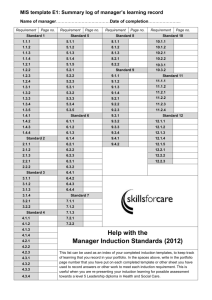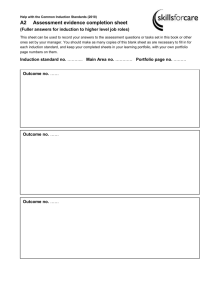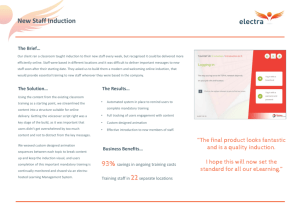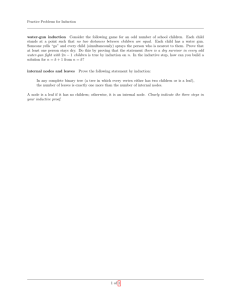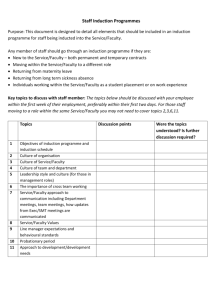Guide to Induction and Probation for Managers
advertisement
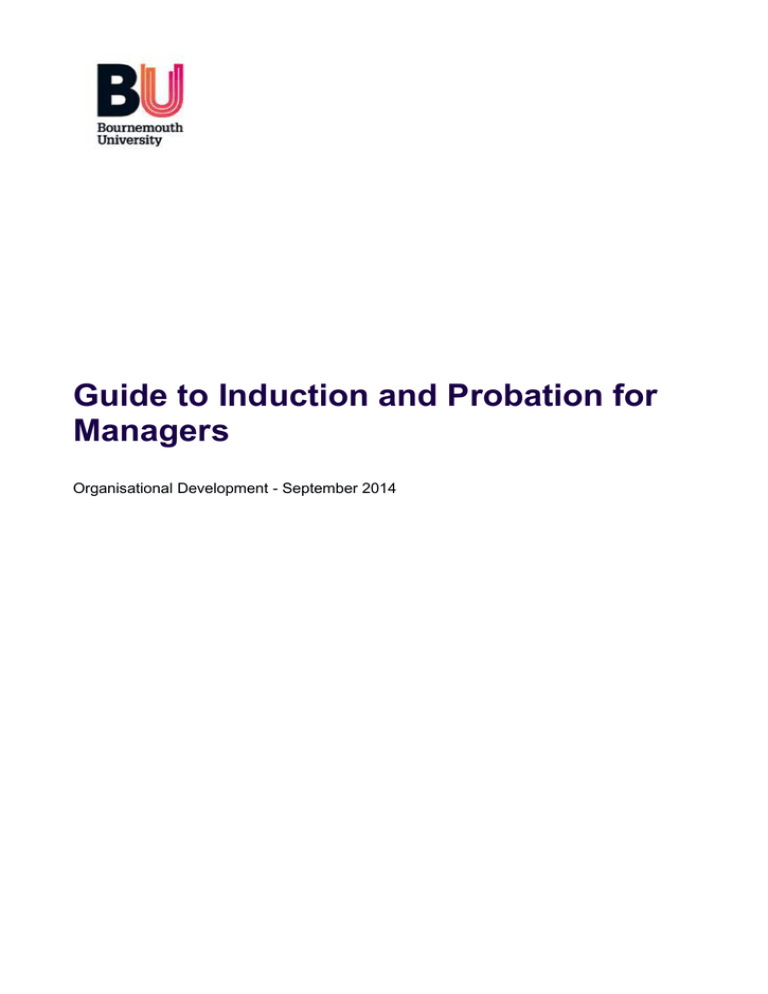
Guide to Induction and Probation for Managers Organisational Development - September 2014 Your new member of staff will have a lot of information to take in during their first few months. Not only will they be learning a new role, but also about how BU works as an organisation. In order to support new member of staff to settle quickly in their role, we have created some resources to help you to introduce them to BU, including helpful checklists and tips. Induction Why have an induction? An induction period supports new members of staff to settle into their roles as quickly and effectively as possible. A good induction programme: Helps new members of staff to understand their role, the department they work in and the organisation as a whole Familiarises them with the physical environment, the culture and procedures Ensures that they understand their legal responsibilities Helps the new member of staff to feel part of their team, as well as part of the wider BU community, quicker Who needs an induction? All new staff need an induction. The nature of the induction will vary, depending on whether they are in an academic, professional or support staff role; full or part-time; on a permanent or short-term contract; completely new to the organisation or an internal appointment. Even those being promoted within a department will benefit from an induction programme. Something very similar to an induction programme will also be needed by those returning after career breaks or long-term absence and maternity leave even if they are returning to their original role. Such a programme provides you with an opportunity to think through and plan their re-entry to the workplace, including immediate work priorities and long-term projects, as well as clarifying how and where the returning member of staff can make an immediate contribution. Good practice suggests that induction programmes should be carefully planned; written down and shared with the relevant members of staff who may have their own suggestions about what they need to learn, or knowledge and skills they need to refresh, and how best to do this. What happens during an induction One of the problems many new starters face is that they quickly become overwhelmed with information. There is so much they need to learn, it can be difficult to decide where to start. During their fist week your new member of staff will receive ‘Welcome Emails’from Organisational Development (OD). One on their first day, welcoming them to the organisation and leading them to the ‘New to BU’ staff intranet pages. They also receive a separate email invitation to the next New Staff Induction day event and any specialist induction events relevant to their role. The New to BU Staff Intranet site This site has been created to provide new staff with all they need to know about our central induction process quickly and easily. The site will direct them to: BU2018 – this section links them to the BU2018 pages so they can find out more about BU’s strategic direction. You should also provide your new staff member with a summary of your Delivery Plan so that they understand the role of their School/ Professional Service in the delivery of BU2018. BU Basics - Essential information in their first few weeks and months including how to access their emails remotely or how to book a room. This supercedes the New Starter Induction Guide. o BU Basics includes a section on ‘Your Induction & Probation’ – giving them an overview of the induction process and ‘what to expect’ including the Induction checklist. This is split into two sections: things for them to complete independently as well as a section on things their line manager will go through with them in their first week. Why not take a few minutes to browse the site and see how much it covers – New to BU. Finally... It is good practice to diary time for new staff to attend relevant events, particularly during their first six months with BU. These help increase contextual understanding of the University as well as providing opportunities to meet other new staff and network. Together they support new staff in working to their full capacity, quicker. You could also diary time in for 1-2-1’s on a weekly or fortnightly basis to review progress with their work as well as how they are settling in. If you need any further help in putting together a local induction programme, please contact Organisational Development on 65014 or email: OD@bournemouth.ac.uk Probation Why is a probation period required? A probationary period provides a new employee with the opportunity to demonstrate that they are able to do the job to which they have been appointed, and apply the knowledge and skills the post requires. It is also an opportunity for the University to test the individual’s skills and experience as demonstrated at interview. It is a period during which expectations will be explained and support provided as necessary. Line managers have the responsibility to provide the probationer with the means and opportunity to demonstrate their ability. This should involve outlining expectations, giving clear instruction, regular constructive feedback and the provision of appropriate development. At the end of the probationary period, an informed decision needs to be made about whether or not to recommend that the member of staff is confirmed in post. Who should have a probation period? Anyone joining the University from another organisation will normally undergo a probationary period. Where an existing employee is promoted to a higher grade, either within their current department or elsewhere within the university, it may also be appropriate for HR to apply a probationary period. What happens during the probation period? At BU, staff will receive either a six month probationary period for Professional and Support Staff, or a 12 month probationary period for academic staff that enables the University to verify the member of staff’s range of skills and experience. The probationary period consists of: 1. Interim probationary review The first (interim) probationary review takes place at 12 weeks for non-academic and research staff, and at 6 months for academic staff. The purpose of the first probationary review is to facilitate discussion around the member of staff’s performance in relation to the requirements of their role, as well as any agreed objectives. It should also determine immediate areas of work where further development is required to enable full performance within the role. In preparation for this review a convenient time and location should be agreed and both parties should think about the issues they wish to discuss. The review should be a twoway conversation. Use job-specific examples of performance to inform discussions. For example, identify a situation where the individual showed particular initiative, or a specific task that was not completed in line with a request. The probationary review forms (follow this link and go to the section on ‘Induction & Probation’) provide a structure for this review. In brief, first seek the employee’s own assessment of their performance and then discuss your assessment, offering clear explanation. Record the main points raised by both parties and agree any action/development plans identified, or objectives/goals set, with timescales, if appropriate. 2. Final probationary review The second probationary review takes place at 20 weeks for non-academic and research staff and 12 months for academic staff. The purpose and process of this review is much the same as for the first review. Objectives agreed during the first review should be reviewed and monitored as necessary. In addition however, you will need to decide whether or not to recommend that the member of staff is confirmed in post. While this is the case with the majority of staff, in exceptional circumstances, after an individual has had ample opportunity to develop their skills and knowledge, it is possible and sometimes advisable to extend the probationary period or even to terminate employment. In considering either of these options, please seek early advice from an HR Adviser. The completed review forms should be sent to Human Resources, with copies being given to the job holder, the head of department and (for non-academic and research staff) the immediate supervisor. Helpful Checklists and Tips As part of the local induction for your new member of staff, here is some guidance on helpful things you as a Line Manager can do before they start, on their first day, in their first week and during their first few months at BU: Before they start: Things to arrange before they start, for all staff: Item Order any additional furniture or equipment (including phones, computers, etc) Order keys, swipe cards, staff ID/Library card Set up IT and phone accounts Set up any other necessary authorisations (for budgets, etc) Inform other people that someone new is starting, particularly immediate colleagues and those in other departments with whom they will have regular contact Liasie with HR about the arrangements for their first day: when and where the new starter needs to go, and who they should ask for Book them into meetings with team members, key stakeholders etc. Don’t forget to send them diary invites for these We offer individualised support for staff such as English Language Proficiency. Have a think if there is anything we could offer your new starter. Nominate an established colleague to act as a Buddy Things to include in the induction of Academic staff Item Draw attention to the academic policies, regulations and procedures handbook Introduce Fusion Outline the process for creating a Standard academic staff profile Introduce the Research Blog Before their first day: Things to do for all staff for their first day’s induction: Item: Introduce people: • Immediate colleagues • Their buddy Conduct a local tour, including: • Ways in/out (highlight any security issues) • Fire exits - explain fire alarm system, evacuation procedure and Notes Notes Notes assembly point (it’s best to walk these through rather than just describe them) • Discuss need for Personal Emergency Evacuation Plan if applicable • Also explain emergency procedures and use of 222 number • Toilets • Catering facilities (explain the coffee/ tea rituals for your team/ area) Conduct an IT induction, including:he first day • Log-in details • How to access HR Info • Talk through any systems they will be using such as Unit E or BRIAN and mention when they will be shown how to use these • IT Staff Intranet pages for new staff • Changing details in the telephone directory Check all relevant paperwork has been sent to HR, including: • Original or verified copies of specified documentation (confirming right to work in UK) • Payroll details • Original or verified copies of academic and professional qualifications • Pension forms • Signed Terms & Conditions • Statement of Health form • P45 Issue them with their: • Keys/swipe cards etc • Staff ID/Library card Provide them with: •Details of the New to BU intranet pages • An overview of the School/Professional Service, and organisational charts • A timetable of their planned induction, covering at least the first few days (remember to book them onto the next central New Staff Induction event) • An outline of what work needs to be completed in the first few days/week Allow time for them: • To settle in • To reflect • To do some actual work (people like to feel they’re making a real contribution early on hence it is good practice to identify in advance several specific tasks) Agree when to meet again and plan regular 1:1’s, particularly during their first few months During their first week Things to do during their first week: Item: Introduce Bournemouth University’ Strategic plans, Vision and Values: • Explain how your department/role contribute to this • Explain the links with your Delivery Plan • Explain how their objectives help contribute towards these Complete the University’s Induction Checklist and return to HR (must be done by end of week two) Provide a more detailed introduction to Health, Safety & Wellbeing (all required information below can be found on the Health Safety & Wellbeing pages): • Introduce local fire warden • Introduce local first aider • Show first aid facilities • Explain accident reporting procedures • Introduce Assessrite, the on-line Display Screen Equipment assessment • Explain the process for reporting Health and Safety concerns • Explain their risk assessment responsibilities and arrangements (book place on workshop if required) Introduce them to a network relevant to their role Draw attention to HR policies, including: • Sickness/absence • Grievance/disciplinary • Probation • Performance Appraisal • Show location of Staff Handbook • Explain the process for requesting annual leave, and issue annual leave record Explain local administrative arrangements, such as: • Photocopying/faxing, including use of print cards • Ordering stationery • Post • Filing • Booking rooms/catering • Claiming Expenses Introduce any relevant issues around Data Protection and Freedom of Information (follow this link and go to the ‘Staff Policies’ section) Explain internal communications, including: • Inside BU • Staff Intranet including the news page and Blogs Notes • Any local newsletters Assess urgent IT development needs (such as Unit-E), and arrange attendance at appropriate workshps Explain the probation procedure and set dates for formal reviews Take them on a tour of both campus’ and explain how the University buses work (free with staff card, term-time and vacation timetables etc) During their first month What to include in their first month: Item: Highlight benefits/facilities available to staff, including: • Library • Gym • Staff discounts (including free bus between the seperate campuses) • Personal items – where staff can buy, sell or advertise personal items • Childcare • Employee Assistance Programme (EAP) • Trade Union membership Introduce the University’s Dignity, Diversity and Equality policies (Follow this link and go to ‘People’ then ‘Dignity, Diversity and Equality’) • Ensure they have completed the Marshall Diversity in the Workplace e-learning package Agree objectives and development needs for the first few months (refer to the Working at BU for events already planned, or talk to Organisational Development about additional needs identified on x 65014) Have regular one-to-one meetings to ensure they are settling into their role and life at the University Introduce BU’s branding guidelines Notes
